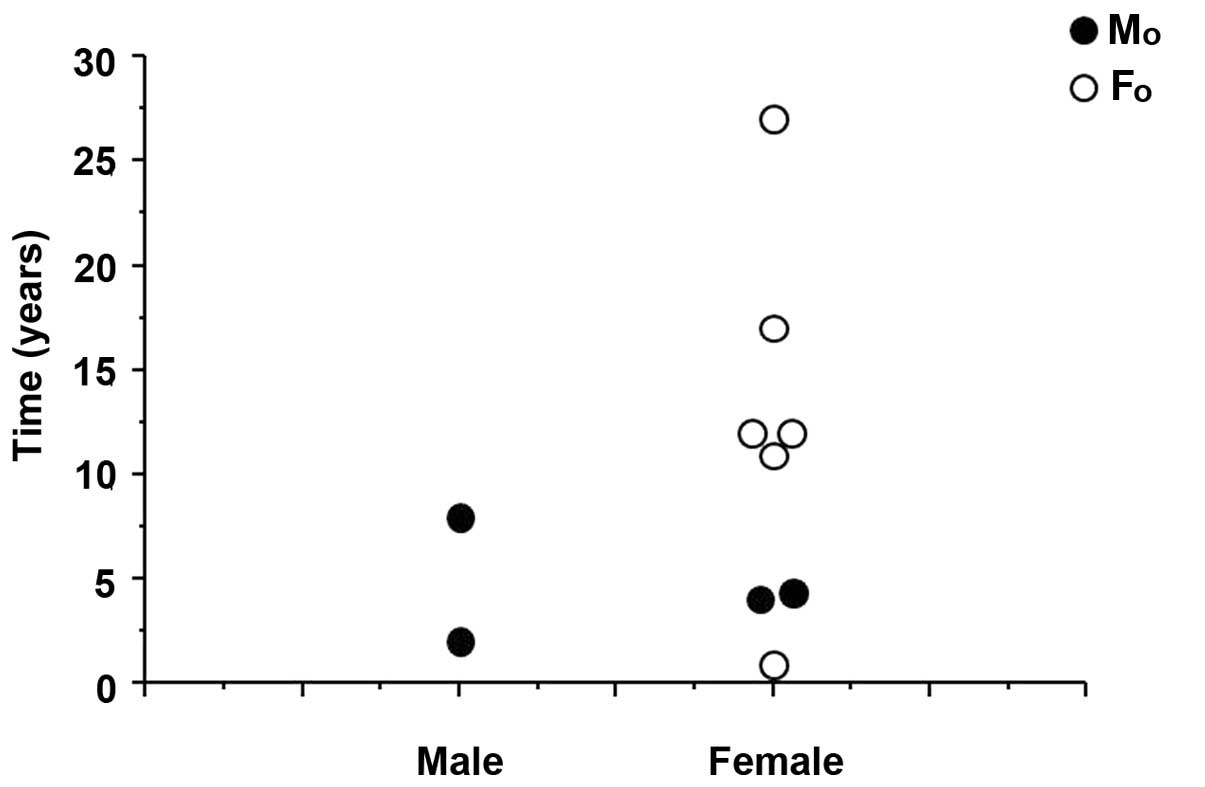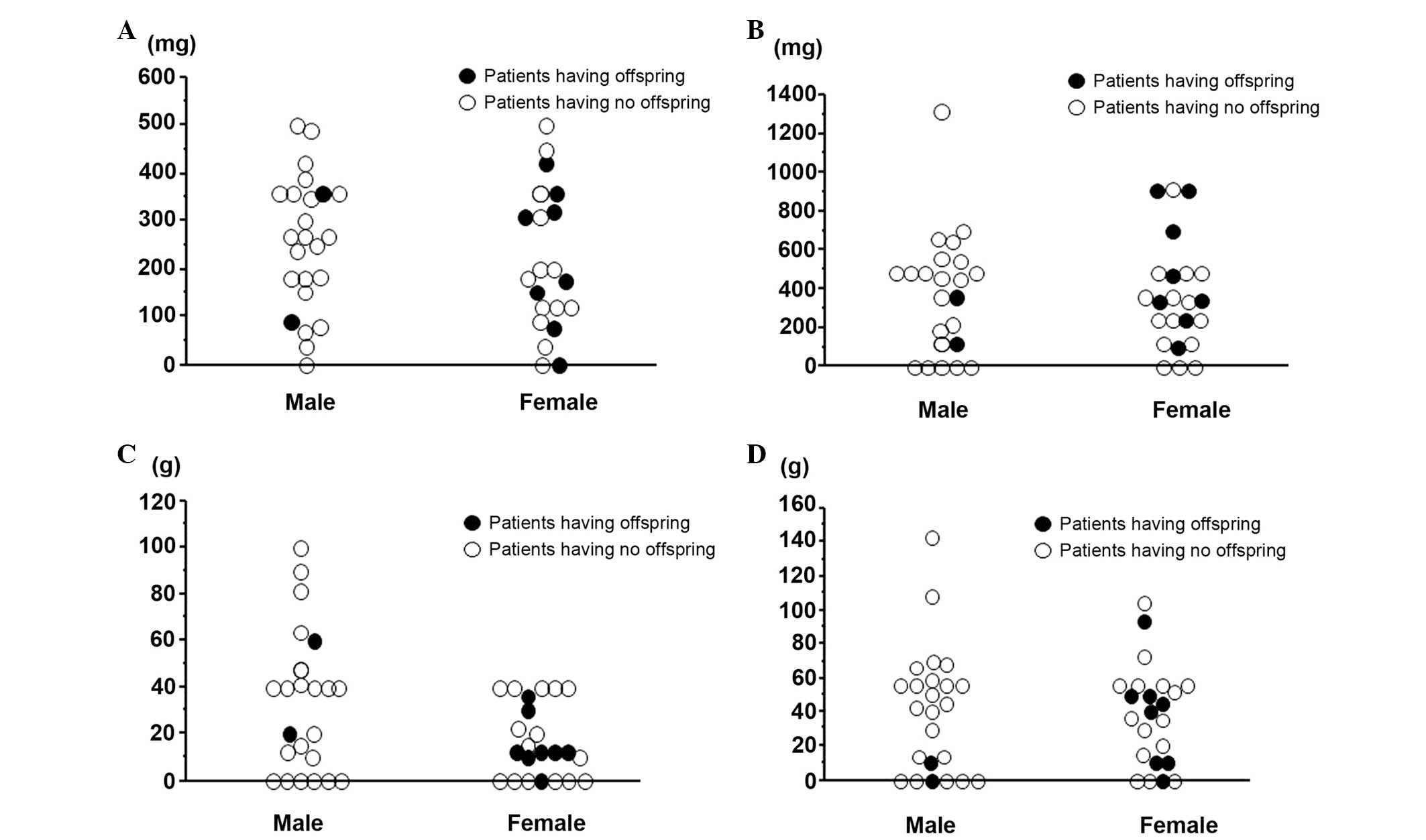|
1
|
Meyers PA, Heller G, Healey J, Huvos A,
Lane J, Marcove R, Applewhite A, Vlamis V and Rosen G: Chemotherapy
for nonmetastatic osteogenic sarcoma: the Memorial Sloan-Kettering
experience. J Clin Oncol. 10:5–15. 1992.PubMed/NCBI
|
|
2
|
Meyers PA, Gorlick R, Heller G, Casper E,
Lane J, Huvos AG and Healey JH: Intensification of preoperative
chemotherapy for osteogenic sarcoma: results of the Memorial
Sloan-Kettering (T12) protocol. J Clin Oncol. 16:2452–2458.
1998.PubMed/NCBI
|
|
3
|
Yang JC, Chang AE, Baker AR, Sindelar WF,
Danforth DN, Topalian SL, DeLaney T, Glatstein E, Steinberg SM,
Merino MJ and Rosenberg SA: Randomized prospective study of the
benefit of adjuvant radiation therapy in the treatment of soft
tissue sarcomas of the extremity. J Clin Oncol. 16:197–203.
1998.PubMed/NCBI
|
|
4
|
Enneking WF, Spanier SS and Goodman MA: A
system for the surgical staging of musculoskeletal sarcoma. Clin
Orthop Relat Res. 153:106–120. 1980.PubMed/NCBI
|
|
5
|
Kawaguchi N, Ahmed AR, Matsumoto S, Manabe
J and Matsushita Y: The concept of curative margin in surgery for
bone and soft tissue sarcoma. Clin Orthop Relat Res. 419:165–172.
2004. View Article : Google Scholar : PubMed/NCBI
|
|
6
|
Longhi A, Ferrari S, Tamburini A, Luksch
R, Fagioli F, Bacci G and Ferrari C: Late effects of chemotherapy
and radiotherapy in osteosarcoma and Ewing sarcoma patients: the
Italian Sarcoma Group Experience (1983–2006). Cancer.
118:5050–5059. 2012. View Article : Google Scholar : PubMed/NCBI
|
|
7
|
Schover LR, Rybicki LA, Martin BA and
Bringelsen KA: Having children after cancer. A pilot survey of
survivors' attitudes and experiences. Cancer. 86:697–709. 1999.
View Article : Google Scholar : PubMed/NCBI
|
|
8
|
Nagarajan R, Neglia JP, Clohisy DR, Yasui
Y, Greenberg M, Hudson M, Zevon MA, Tersak JM, Ablin A and Robison
LL: Education, employment, insurance, and marital status among 694
survivors of pediatric lower extremity bone tumors: a report from
the childhood cancer survivor study. Cancer. 97:2554–2564. 2003.
View Article : Google Scholar : PubMed/NCBI
|
|
9
|
Drasga RE, Einhorn LH, Williams SD, Patel
DN and Stevens EE: Fertility after chemotherapy for testicular
cancer. J Clin Oncol. 1:179–183. 1983.PubMed/NCBI
|
|
10
|
Pryzant RM, Meistrich ML, Wilson G, Brown
B and McLaughlin P: Long-term reduction in sperm count after
chemotherapy with and without radiation therapy for non-Hodgkin's
lymphomas. J Clin Oncol. 11:239–247. 1993.PubMed/NCBI
|
|
11
|
Reichman BS and Green KB: Breast cancer in
young women: effect of chemotherapy on ovarian function, fertility,
and birth defects. J Natl Cancer Inst Monogr. 16:125–129.
1994.PubMed/NCBI
|
|
12
|
Longhi A, Macchiagodena M, Vitali G and
Bacci G: Fertility in male patients treated with neoadjuvant
chemotherapy for osteosarcoma. J Pediatr Hematol Oncol. 25:292–296.
2003. View Article : Google Scholar : PubMed/NCBI
|
|
13
|
Hosalkar HS, Henderson KM, Weiss A,
Donthineni R and Lackman RD: Chemotherapy for bone sarcoma does not
affect fertility rates or childbirth. Clin Orthop Relat Res.
428:256–260. 2004. View Article : Google Scholar : PubMed/NCBI
|
|
14
|
Yonemoto T, Tatezaki S, Ishii T and
Hagiwara Y: Marriage and fertility in long-term survivors of high
grade osteosarcoma. Am J Clin Oncol. 26:513–516. 2003. View Article : Google Scholar : PubMed/NCBI
|
|
15
|
Yonemoto T, Ishii T, Takeuchi Y, Hagiwara
Y, Iwata S and Tatezaki S: Recently intensified chemotherapy for
high-grade osteosarcoma may affect fertility in long-term male
survivors. Anticancer Res. 29:763–767. 2009.PubMed/NCBI
|
|
16
|
Ishida T and Takami M: Evaluation of
chemotherapy before limb-sparing surgery for osteosarcoma. Int
Orthop. 16:59–61. 1992.PubMed/NCBI
|
|
17
|
Kudawara I, Aoki Y, Ueda T, Araki N, Naka
N, Nakanishi H, Matsumine A, Ieguchi M, Mori S, Myoui A, Kuratsu S,
Hashimoto N and Yoshikawa H: Neoadjuvant and adjuvant chemotherapy
with high-dose ifosfamide, doxorubicin, cisplatin and high-dose
methotrexate in non-metastatic osteosarcoma of the extremities: a
phase II trial in Japan. J Chemother. 25:41–48. 2013. View Article : Google Scholar : PubMed/NCBI
|
|
18
|
Tsuchiya H, Tomita K, Mori Y, Asada N and
Yamamoto N: Marginal excision for osteosarcoma with caffeine
assisted chemotherapy. Clin Orthop Relat Res. 358:27–35. 1999.
View Article : Google Scholar : PubMed/NCBI
|
|
19
|
Juergens C, Weston C, Lewis I, Whelan J,
Paulussen M, Oberlin O, Michon J, Zoubek A, Juergens H and Craft A:
Safety assessment of intensive induction with vincristine,
ifosfamide, doxorubicin, and etoposide (VIDE) in the treatment of
Ewing tumors in the EURO-E.W.I.N.G. 99 clinical trial. Pediatr
Blood Cancer. 47:22–29. 2006. View Article : Google Scholar : PubMed/NCBI
|
|
20
|
Tanaka K, Kawamoto H, Saito I, Yoshimura
K, Fukuda H and Iwamoto Y: Preoperative and postoperative
chemotherapy with ifosfamide and adriamycin for adult high-grade
soft-tissue sarcomas in the extremities: Japan Clinical Oncology
Group Study JCOG0304. Jpn J Clin Oncol. 39:271–273. 2009.
View Article : Google Scholar : PubMed/NCBI
|
|
21
|
Van Winkle P, Angiolillo A, Krailo M,
Cheung YK, Anderson B, Davenport V, Reaman G and Cairo MS:
Ifosfamide, carboplatin, and etoposide (ICE) reinduction
chemotherapy in a large cohort of children and adolescents with
recurrent/refractory sarcoma: the Children's Cancer Group (CCG)
experience. Pediatr Blood Cancer. 44:338–347. 2005. View Article : Google Scholar : PubMed/NCBI
|
|
22
|
Byrne J, Mulvihill JJ, Myers MH, et al:
Effects of treatment on fertility in long-term survivors of
childhood or adolescent cancer. N Engl J Med. 317:1315–1321. 1987.
View Article : Google Scholar : PubMed/NCBI
|
|
23
|
2013 Statistics of the Ministry of Health
Labor and Welfare of Japan, . Marriage, Childbirth Childrearing,
Natality. http://www.mhlw.go.jp/toukei/youran/index-kourou.htmlAccessed.
January 30–2014
|
|
24
|
Spitz S: The histological effects of
nitrogen mustards on human tumors and tissues. Cancer. 1:383–398.
1948. View Article : Google Scholar
|
|
25
|
Bacci G, Ferrari S, Bertoni F, Ruggieri P,
Picci P, Longhi A, Casadei R, Fabbri N, Forni C, Versari M and
Campanacci M: Long-term outcome for patients with nonmetastatic
osteosarcoma of the extremity treated at the Istituto Ortopedico
Rizzoli according to the Istituto Ortopedico Rizzoli/osteosarcoma-2
protocol: an updated report. J Clin Oncol. 18:4016–4027.
2000.PubMed/NCBI
|
|
26
|
Kenney LB, Laufer MR, Grant FD, Grier H
and Diller L: High risk of infertility and long term gonadal damage
in males treated with high dose cyclophosphamide for sarcoma during
childhood. Cancer. 91:613–621. 2001. View Article : Google Scholar : PubMed/NCBI
|
|
27
|
Meistrich ML, Wilson G, Brown BW, da Cunha
MF and Lipshultz LI: Impact of cyclophosphamide on long-term
reduction in sperm count in men treated with combination
chemotherapy for Ewing and soft tissue sarcomas. Cancer.
70:2703–2712. 1992. View Article : Google Scholar : PubMed/NCBI
|
|
28
|
Williams D, Crofton PM and Levitt G: Does
ifosfamide affect gonadal function? Pediatr Blood Cancer.
50:347–351. 2008. View Article : Google Scholar : PubMed/NCBI
|
|
29
|
Longhi A, Pignotti E, Versari M, Asta S
and Bacci G: Effect of oral contraceptive on ovarian function in
young females undergoing neoadjuvant chemotherapy treatment for
osteosarcoma. Oncol Rep. 10:151–155. 2003.PubMed/NCBI
|
|
30
|
Meistrich ML, Chawla SP, Da Cunha MF,
Johnson SL, Plager C, Papadopoulos NE, Lipshultz LI and Benjamin
RS: Recovery of sperm production after chemotherapy for
osteosarcoma. Cancer. 63:2115–2123. 1989. View Article : Google Scholar : PubMed/NCBI
|
|
31
|
Wallace WH, Shalet SM, Crowne EC,
Morris-Jones PH, Gattamaneni HR and Price DA: Gonadal dysfunction
due to cis-platinum. Med Pediatr Oncol. 17:409–413. 1989.
View Article : Google Scholar : PubMed/NCBI
|
|
32
|
Shamberger RC, Rosenberg SA, Seipp CA and
Sherins RJ: Effects of high-dose methotrexate and vincristine on
ovarian and testicular functions in patients undergoing
postoperative adjuvant treatment of osteosarcoma. Cancer Treat Rep.
65:739–746. 1981.PubMed/NCBI
|
|
33
|
Waxman J: Chemotherapy and the adult
gonad: a review. J R Soc Med. 76:144–148. 1983.PubMed/NCBI
|
|
34
|
Royal College of Obstetricians and
Gynaecologists, . Pregnancy and B reast Cancer (Green-top Guideline
No. 12). http://www.rcog.org.uk/guidelinesAccessed.
January 27–2014
|
|
35
|
Helewa M, Lévesque P, Provencher D, Lea
RH, Rosolowich V and Shapiro HMBreast Disease Committee and
Executive Committeee and Council, Society of Obstetricians
Gynaecologists of Canada: Breast cancer, pregnancy, and
breastfeeding. J Obstet Gynaecol Can. 24:164–184. 2002.(In English,
French).
|
|
36
|
ESMO/European Sarcoma Network Working
Group, . Soft tissue and visceral sarcomas: ESMO Clinical Practice
Guidelines for diagnosis, treatment and follow-up. Ann Oncol. 23
(Suppl 7):vii92–vii99. 2012.PubMed/NCBI
|
|
37
|
Nicholson HS and Byrne J: Fertility and
pregnancy after treatment for cancer during childhood or
adolescence. Cancer. 71 (Suppl 10):3392–3399. 1993. View Article : Google Scholar : PubMed/NCBI
|
|
38
|
Shamberger RC, Sherins RJ and Rosenberg
SA: The effects of postoperative adjuvant chemotherapy and
radiotherapy on testicular function in men undergoing treatment for
soft tissue sarcoma. Cancer. 47:2368–2374. 1981. View Article : Google Scholar : PubMed/NCBI
|
|
39
|
Siimes MA, Elomaa I and Koskimies A:
Testicular function after chemotherapy for osteosarcoma. Eur J
Cancer. 26:973–975. 1990. View Article : Google Scholar : PubMed/NCBI
|
|
40
|
Lee SJ, Schover LR, Partridge AH, Patrizio
P, Wallace WH, Hagerty K, Beck LN, Brennan LV and Oktay KAmerican
Society of Clinical Oncology: American Society of Clinical Oncology
recommendations on fertility preservation in cancer patients. J
Clin Oncol. 24:2917–2931. 2006. View Article : Google Scholar : PubMed/NCBI
|
|
41
|
Loren AW, Mangu PB, Beck LN, Brennan L,
Magdalinski AJ, Partridge AH, Quinn G, Wallace WH and Oktay
KAmerican Society of Clinical Oncology: Fertility preservation for
patients with cancer: American Society of Clinical Oncology
clinical practice guideline update. J Clin Oncol. 31:2500–2510.
2013. View Article : Google Scholar : PubMed/NCBI
|
















